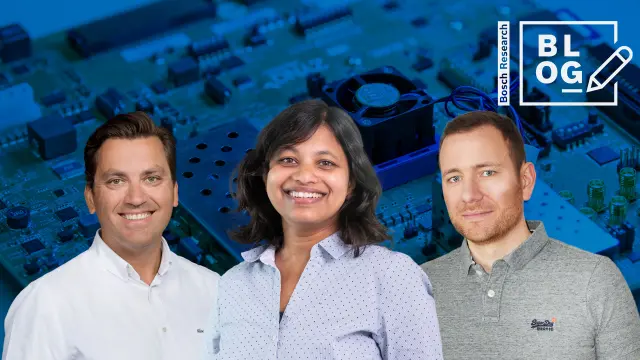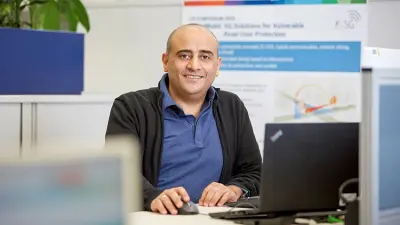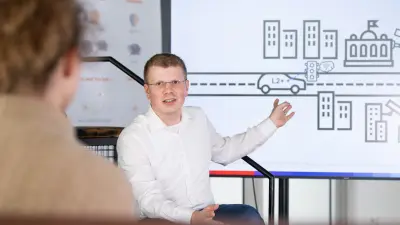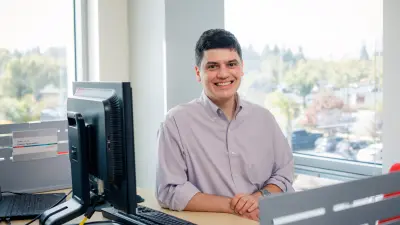Dr. Dakshina Dasari
Research Engineer, Dynamic Distributed Systems
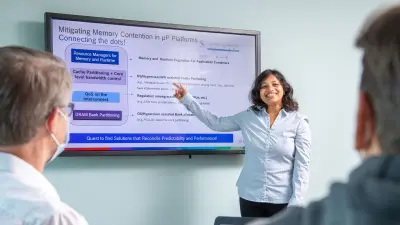
I am a Research Engineer in the “Dynamic Distributed Systems” group and in this role I work on designing solutions to enable applications to meet their quality of service requirements when deployed on computing platforms. My job is particularly interesting since it lies at the conjunction of different disciplines including Cyber Physical systems, High Performance Computing architectures and Real-time scheduling theory. The focus is on designing and evaluating innovative methods and mechanisms for resource management which are correct-by-construction, formally sound and help in efficiently utilizing the underlying platforms, while also adhering to the application specific constraints.
Please tell us what fascinates you most about research.
As a researcher what fascinates me most is the freedom to systematically explore, transform and innovate. The process of tapping interdisciplinary and collective knowledge with the goal of solving complex problems is very satisfying. Most importantly, research lets you retain the child-like enthusiasm about discovering something new, and keeps the spark of curiosity alive!
What makes research done at Bosch so special?
Bosch is extremely diverse in its range of products and in the background, a range of technologies fueling these products. So as a researcher, there are ample opportunities and channels to innovate and the field is laid open to bring one’s ideas to realization. While there is a focus on applied research, researchers are also encouraged to collaborate with academia, participate in conferences, publish new work and be part of public funded projects. To me personally, working in an industrial setup, while not losing your academic roots offers the best of both worlds. I also believe that the expertise of the research division is sought after and truly valued at Bosch. All these factors put together, make Bosch Research a great place to work.
What research topics are you currently working on at Bosch?
My primary work aims at efficiently providing QoS guarantees at design time to applications hosted on modern heterogeneous hardware platforms. It involves understanding the resource usage profile of applications, dissecting the different architectural features offered by these platforms and then designing novel composable mechanisms to monitor and allocate resources (memory and compute power) efficiently, while meeting different application constraints. These topics have become increasingly relevant in the changing landscape of automotive E/E architecture space, where we are transitioning from a modular architecture towards a centralized architecture in which several vehicle functions are integrated on fewer powerful heterogeneous microprocessors. In such a scenario, existing mechanisms are not equipped to handle this complexity, newer mechanisms are warranted and our job is to address this widening gap.
What are the biggest scientific challenges in your field of research?
The scientific challenges in designing predictable computing systems and providing design-time assurances on the QoS, are multifold. On the hardware front, most modern processors that are used for hosting embedded systems are not inherently designed for predictability but rather for performance: reconciling these two design goals is non-trivial. Also chip manufacturers often do not disclose key information needed to dissect the underlying problems. Secondly, complex interactions between the software, middleware and hardware make it difficult to trace the sources of unpredictability and reason about the performance. The key problem is providing these design-time assurances in the face of uncertainty, for example the uncertainty about the nature of applications that will be added dynamically during the product lifetime. Another non-technical challenge is also about changing the mindset of system designers and developers to incorporate principles of predictable design right from the beginning of the design process, and not try to retrofit it later. We deal with truly complex systems for which existing theoretical solutions from academic literature do not always suffice, and cannot be directly applied since they do not consider all the intricacies of the problem domain. To this end, we are in the constant pursuit to develop solutions that are elegant and at the same time simple enough to be easily maintained and extended over the product lifetime.
How do the results of your research become part of solutions “Invented for life”?
I believe that the need for predictable performance and guarantees on the quality of service is a common denominator for most embedded products used in our day-to-day lives. As a natural consequence, we are striving to design solutions that are truly “Invented for life”.
Curriculum vitae
Since 2014
Bosch Research
2014
Obtained PhD from University of Porto
2007
Citrix R&D Systems India

Selected publications

Dasari et al., 2014
- Dakshina Dasari, Borislav Nikolic, Vincent Nelis, Stefan Petters
- Transactions on Embedded Computing Systems (TECS)

Dasari et al., 2015
- Dakshina Dasari, Vincent Nelis, Benny Akesson
- Journal of Real Time Systems (RTS)

Dasari et al., 2020
- Dakshina Dasari, Paul Austin, Michael Pressler, Arne Hamann, Dirk Ziegenbein
- Design Automation and Test in Europe (DATE 2020)

M. Becker et al., 2016
- Mathias Becker, Dakshina Dasari, Borislav Nikolic, Benny Akesson, Vincent Nelis, Thomas Nolte
- Euromicro Conference on Real-Time Systems (ECRTS 2016)
Get in touch with me
Dr. Dakshina Dasari
Research Engineer, Dynamic Distributed Systems
